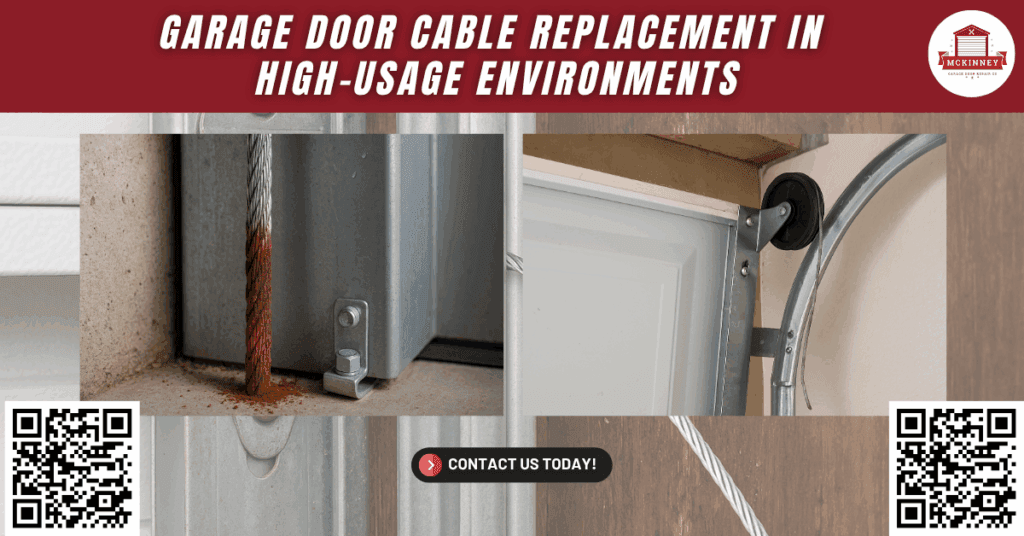At McKinney Garage Door Repair Co., we recently assisted a local auto service shop in Houston that faced a major issue. Their garage door, which cycled more than 40 times daily, jammed midway during operation. One of the garage door cables had frayed and snapped, halting business operations. Our technicians responded swiftly, replacing the damaged cable, rebalancing the spring tension, and restoring full functionality within hours. This situation could have been much worse. A dropped garage door could have damaged expensive tools, injured a worker, or caused massive delays.
Garage door cable replacement is a critical maintenance task that should never be overlooked, especially in high-usage environments. In busy commercial and residential settings, garage doors cycle multiple times per day. Over time, the strain placed on components like cables, springs, and drums leads to wear, fatigue, and eventual failure. Industry data suggests most cables are rated for about 10,000 cycles, but doors in high-traffic environments can exceed that threshold in just a couple of years.
In this comprehensive guide, we explain the role of garage door cables, what causes them to wear out, how to recognize early warning signs, and the importance of professional maintenance. Whether you operate a commercial loading dock, manage a multifamily complex, or have a multi-car household, this guide is for you.
What Do Garage Door Cables Do?
Garage door cables are high-tension wires essential for the smooth and safe operation of the door. They work in tandem with torsion or extension springs, pulleys, and drums to lift and lower the garage door. These cables bear a significant portion of the door’s weight, guiding it evenly during operation and keeping it aligned on the track.
Torsion Spring System
In a torsion spring system, the cable connects to the bottom bracket of the garage door and wraps around a cable drum mounted at the top of the door near the torsion tube. When the torsion spring turns, it creates tension that lifts the door. The cables act as messengers, transferring the spring’s force to move the door.
Extension Spring System
In an extension spring setup, the cables run along pulleys attached to the springs. As the door opens and closes, these cables stretch and contract with the springs to move the door along the track.
No matter the system, garage door cables are under constant tension. They experience stress every time the door cycles. This makes them vulnerable to wear and eventual failure if not maintained regularly.
Why High-Usage Environments Demand More Attention
In standard residential settings, a garage door may operate 3 to 5 times a day. However, in commercial and high-traffic environments, that number can skyrocket to 20, 30, or even 50 cycles per day. This puts a massive strain on every part of the garage door system, especially the cables.
Common High-Usage Scenarios
- Commercial Warehouses: These often have multiple garage doors working continuously to manage shipments and deliveries. Doors are frequently larger and heavier, which means the cables support more weight and cycle more often.
- Auto Service Centers and Fleet Garages: Garage doors in these settings open and close with every customer interaction, causing the cables to wear out faster than in typical homes.
- Multi-Vehicle Households and Apartment Complexes: In homes with multiple drivers or shared garages, frequent use leads to accelerated wear. Families with teenage drivers or daily deliveries may open the door over 10 times per day.
- Distribution Centers and Delivery Hubs: Here, the garage doors act as critical infrastructure. Any downtime leads to shipment delays and increased costs.
If garage door cable replacement is delayed in these environments, the risk of damage, injury, or expensive repairs increases significantly.
Why Do Garage Door Cables Fail?
Garage door cables, despite being made from high-grade steel, are not indestructible. Over time and with frequent use, various factors lead to their degradation.
Primary Causes of Cable Failure
- Friction and Abrasion: Cables continuously rub against drums, pulleys, or other metal surfaces. Over time, this causes the strands to fray and weaken.
- Rust and Corrosion: Humid environments, coastal air, or lack of proper maintenance can cause cables to corrode. Rust weakens the cable and accelerates breakage.
- Improper Spring Tension: Incorrect tension in the springs places uneven force on the cables, leading to stress concentration and premature failure.
- Age and Fatigue: Even with light use, cables deteriorate with age. The metal becomes brittle, especially in extreme temperatures.
- Misalignment and Track Issues: If the garage door tracks are bent or the rollers are worn, cables will operate under uneven conditions, accelerating wear.
Neglecting these causes results in cable failure, which can lead to more extensive damage to the garage door system.
Warning Signs That It’s Time to Replace Your Garage Door Cables
Cables rarely snap without giving prior warning. Catching these signs early can prevent accidents and expensive damage.
Common Symptoms of Failing Cables
- Frayed or Broken Strands: Any visible sign of cable wear should be addressed immediately. Frayed cables can snap under tension.
- Rust or Discoloration: Red or brown rust on cables is a sign of corrosion and structural weakness.
- Uneven Door Movement: A door that looks crooked or moves unevenly could be experiencing uneven tension due to worn or broken cables.
- Slack or Loose Cables: Cables should always be taut. If they appear loose when the door is closed, they may have detached or stretched.
- Grinding or Scraping Noises: These sounds may signal cables rubbing against other components or dragging improperly.
If you observe any of these signs, stop using the door and contact a professional garage door service immediately.
Consequences of Ignoring Cable Replacement
Delaying garage door cable replacement can lead to dangerous and costly situations.
Potential Dangers and Costs
- Sudden Door Collapse: A snapped cable can cause the door to fall rapidly, risking injury or damage to property.
- Spring Failure: Overcompensating for a bad cable places extra tension on the springs, causing them to wear out or break.
- Opener Damage: The garage door opener may overexert itself trying to lift a misbalanced door, leading to motor burnout.
- Track and Drum Damage: Misaligned cables cause stress on the track system, leading to bending, warping, or derailment.
- Complete System Failure: One failing component can quickly create a domino effect, requiring a full system overhaul.
Timely cable replacement preserves the integrity of the entire garage door system and protects your investment.
Maintenance Tips for High-Usage Doors
Preventive maintenance is the most effective way to avoid sudden failures and prolong the life of your garage door cables.
Key Maintenance Strategies
- Quarterly Inspections: High-use systems should be inspected at least every three months. Look for rust, wear, and proper tension in cables and springs.
- Lubrication: Apply a silicone-based lubricant to rollers, hinges, and metal components. Avoid lubricating the cables directly, unless advised.
- Install High-Cycle Cables: These cables are designed for frequent use and offer superior durability over standard versions.
- Balance Testing: Have a professional check spring tension and door balance. Unbalanced doors put extra strain on cables and openers.
- Record Cycles: Keep a log of daily door cycles and replace components based on usage, not just time.
Following these tips ensures smooth, safe operation and reduces the need for emergency repairs.
Step-by-Step Guide to Garage Door Cable Replacement
Replacing garage door cables requires precision, safety precautions, and the right tools. It’s not a job for amateurs.
Professional Cable Replacement Process
- Preparation: Disconnect the opener, secure the door in place, and gather the necessary tools, including winding bars and Personal protective equipment (PPE).
- Safety First: Always wear gloves, safety glasses, and ensure the door is stable before starting.
- Release Tension: Carefully unwind the torsion spring using winding bars to safely release stored energy.
- Remove Old Cables: Detach the old cable from the bottom bracket and unwind it from the cable drum.
- Install New Cables: Attach the new cable, ensuring it is routed properly through the drum and pulley system.
- Re-Tension the Springs: Reset spring tension to manufacturer specifications, test door balance.
- Test the System: Reconnect the opener, check for smooth operation, and listen for unusual noises.
Always call a licensed technician for garage door cable replacement. The risk of injury from improper handling is high.
Why You Should Hire a Professional Garage Door Technician
DIY garage door repairs can lead to serious injuries and costly mistakes. A trained professional ensures safety, accuracy, and peace of mind.
Benefits of Hiring a Pro
- Experience and Skill: Trained technicians understand all aspects of garage door systems.
- Specialized Tools: Professionals use the correct tools to ensure a safe and secure installation.
- Warranty Protection: Many garage door parts require professional installation to keep warranties valid.
- Comprehensive Inspections: A professional evaluates the entire system, not just the cables.
At McKinney Garage Door Repair Co., our team is fully equipped to handle cable replacements and all related garage door issues.
How Can McKinney Garage Door Repair Co. Help You?
McKinney Garage Door Repair Co. is your trusted partner for garage door cable replacement in high-usage environments. We understand the critical role that well-functioning garage doors play in your home or business. Whether it’s a busy service center or a family garage, we have the expertise to keep your doors running smoothly.
Our Services Include:
- Garage door cable replacement
- Garage door spring repair
- Opener repair and installation
- Preventive maintenance programs
- Emergency garage door service
McKinney Garage Door Repair Co.
1200 McKinney St, Houston, TX 77010
Phone: (281) 549-0009
Don’t wait until it’s too late. Trust us to keep your garage doors safe, reliable, and ready for anything.
Final Thoughts
In high-traffic environments, the garage door is more than just an entrance; it’s an essential part of your workflow and safety system. The cables, though small, carry a heavy burden. Regular maintenance, early detection of problems, and timely cable replacement are crucial for smooth operation and peace of mind.
Don’t ignore the signs. Keep your garage door system safe and functional with help from the professionals at McKinney Garage Door Repair Co. We’re here to help families and businesses in Houston with expert garage door services designed for durability, safety, and reliability.
Frequently Asked Questions (FAQs)
1. How long does it take to replace garage door cables?
Most professional garage door cable replacements take between 1 to 2 hours, depending on the door’s size, type, and any additional repairs needed.
2. Can I just replace one cable instead of both?
It’s strongly recommended to replace both cables at the same time to maintain balance and prevent uneven wear on the garage door system.
3. Are there different types of garage door cables?
Yes, cables vary by system type (torsion vs. extension), thickness, material, and cycle rating. Commercial doors often require high-cycle or heavy-duty cables.
4. Is it safe to use my garage door if one cable is frayed but not broken?
No, using a door with a frayed cable is unsafe, as it can snap without warning and lead to a door collapse or injury.

